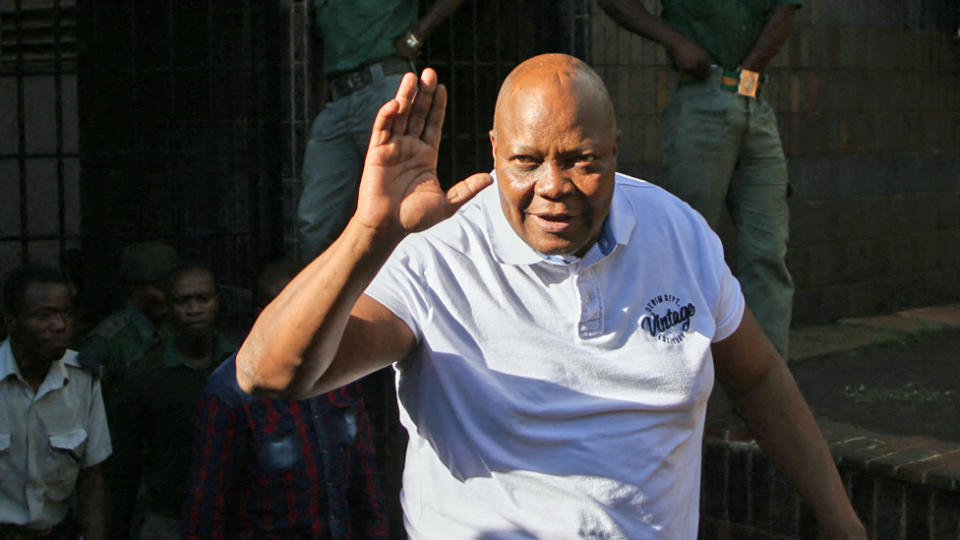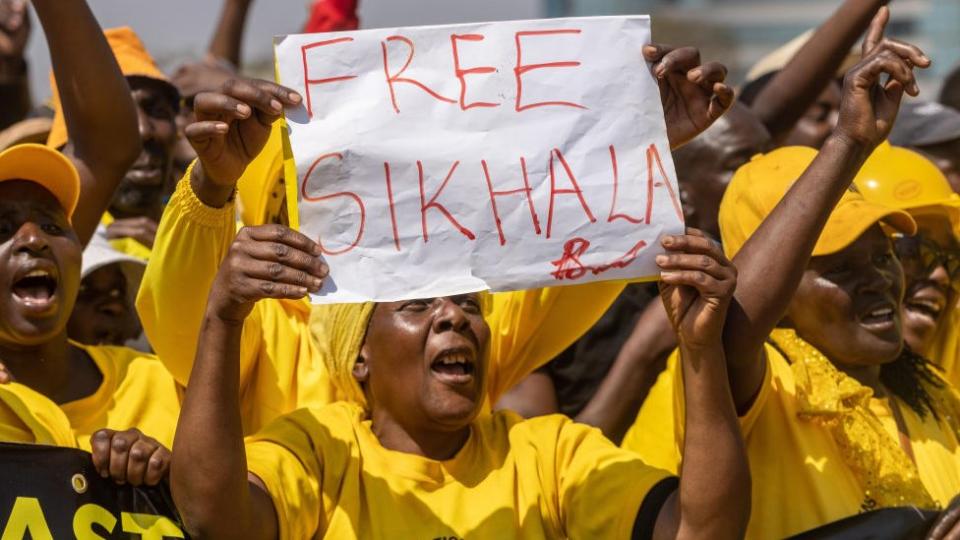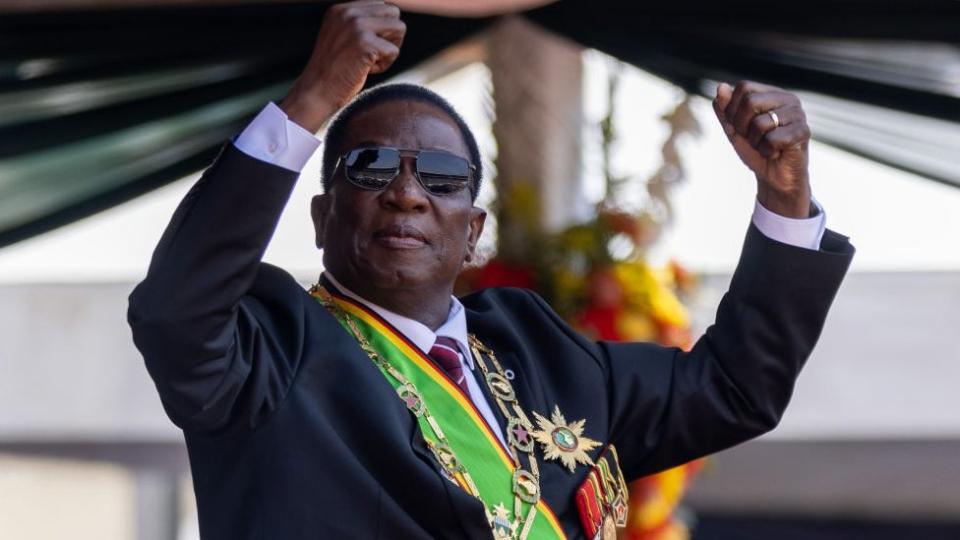Chants of “Wiwa, Wiwa, Wiwa” – a reference to Ken Saro-Wiwa, the renowned writer and environmentalist executed by Nigeria’s military regime in 1995 – rang out through a Zimbabwean courtroom this week.
It is the nickname of opposition politician Job Sikhala, who was sentenced to a two-year suspended sentence after a record 595 days in pre-trial detention.
The 52-year-old former MP and lawyer chose the moniker “Wiwa” whilst at university – and it has defined his political career.
“He admired the bravery of Ken Saro-Wiwa,” opposition MP Daniel Molokele told the BBC.
He went on to describe his close friend as “loud, outspoken, assertive, confident, and someone who always stood up to authority”.
Mr Sikhala, who says he is driven by his desire to end injustice and tyranny in Zimbabwe, joined the Movement for Democratic Change (MDC) in 1999.
The MDC was the first party to mount a real challenge to the ruling Zanu-PF party of Robert Mugabe, the leader who ruled the country from independence in 1980 until he was ousted by his deputy Emmerson Mnangagwa, nicknamed the “crocodile” because of his political cunning, with the backing of the military in 2017.
Now president, Mr Mnangagwa was one of those in the ruling party who lost his seat when the MDC contested its first election.
Mr Sikhala reckons that during his 25-years in the opposition he has been arrested more than 60 times – with his sentence on Tuesday his only conviction.
The fiery politician was last arrested in June 2022 for allegedly inciting public violence. His long detention before trial meant he was denied the opportunity of participating in last year’s election.

After Tuesday’s ruling at the Harare Magistrates Court, he was told he would spend one more night in jail before his release from Chikurubi Maximum Security Prison – a message which quickly circulated on social media.
Instead, the prison authorities ordered him to pack his stuff and leave immediately that evening.
“I was escorted to the gates and dumped by the roadside,” Mr Sikhala told the BBC.
He had to call his lawyers to collect him.
He believes the authorities did not want the scenes of jubilation in court repeated outside the prison gates on Wednesday morning.
“The move was meant to wrongfoot those preparing to welcome me out of Chikurubi,” he said.
Mr Sikhala’s run-ins with authority predate the MDC, says Mr Molokele , who was a fellow student leader at the University of Zimbabwe in the 1990s.
He was not afraid to criticise how the Mugabe government was running the country and its efforts to control the university.
“He endeared himself to other students and held various positions in the Student Representative Council from his first year until he graduated,” Mr Molokele says.
Another former student, who spoke to the BBC on condition of anonymity, remembers an incident when the university security took away Mr Sikhala’s megaphone: “That did not deter him. He told them the students would hear him without a megaphone.”
Younger students tended to look up to him and respect him as he had worked as a high school teacher before enrolling at the university to study economic history, Mr Molokele says.
This was not the end of his studies – years later when an opposition MP he returned to university and qualified as a lawyer.
“The persecution I suffered at the hands of the authorities pushed me to study law, I wanted to understand what they were arresting me for because the arrests seemed so spurious and arbitrary,” he told the BBC.
Mr Sikhala’s transition from campus to national politics was seamless.


A month after he graduated in August 1999, the MDC was formed – and he used his oratory skills to win a seat in parliament the next year.
The violence that preceded the vote set the tone for subsequent elections in Zimbabwe, with members of the MDC subjected to harassment, arrests and beatings.
Being in parliament did not temper Mr Sikhala’s appetite for showing the establishment his disdain.
According to parliamentary etiquette, members are supposed to bow when walking past the Speaker’s chair or on entering or exiting the chamber.
Mr Sikhala refused to honour Mr Mnangagwa, who was appointed Speaker after his humiliating defeat in 2000.
“I’d never [show] courtesy to that dictator,” he told me, going on to explain that he holds Mr Mnangagwa responsible for the post-independence massacres known as Gukurahundi.
Mr Mnangagwa, who was national security minister at that time in the early 1980s, has denied any role in the killings of ethnic Ndebele in southern Matabeleland.
Not long before Mr Mnangagwa took over the presidency in 2017, Mr Sikhala wrote him a long open letter saying: “No matter how much you might try to downplay or trivialise your role in the massacre of innocent civilians in Matabeleland during Gukurahundi, we know for a fact that one of our own family members, who is my aunt, died because of your active participation and direct underground command.”
He went on to blame Mr Mnangagwa for a litany of abuses dating back to the liberation war days. The letter concluded with a warning: “Zimbabweans are waiting for that day they will revenge against you in the ballot box.”


During his career, Mr Sikhala has swapped opposition parties, even founding his own in 2010 – though it was not a success.
He was elected vice-chairperson of the main MDC faction before it morphed into the Citizens Coalition for Change (CCC) in 2022 – a position he held at the time of his arrest.
Mr Sikhala believes the authorities kept him locked up to stop him from running for parliament last August.
But Justice Minister Ziyambi Ziyambi denies this: “Our courts are independent, and they are doing their job with no interference.”
From prison, Mr Sikhala wrote long and open letters talking about his extended detention and the inhumane conditions in prison where he was held in chains.
Every time he was brought to court he was shackled with handcuffs and/or leg irons.
This is in stark contrast to some high-ranking ruling party members accused of corruption who walk into court unfettered.
When Mr Sikhala was admitted to hospital for a few days during his detention, he was kept under guard in leg irons.
Instead of this treatment silencing the most vocal of the president’s critics, it has made him a cause célèbre, with the US, other governments and Amnesty International calling for his release.
Mr Sikhala has always sought to remain a “man of the people”, refusing to move from his family home in the working-class neighbourhood of Chitungwiza to wealthier suburbs of the capital, Harare, where most politicians reside away from their constituencies.
“I will always live amongst the people that I represent; I won’t move to the so-called leafy suburbs,” he told the BBC.
After his return to Chitungwiza on Wednesday, where crowds came to welcome him home, he said his incarceration had not dampened his desire to stand up against injustice.
His continuing legal woes – charges of disorderly conduct, inciting violence and publishing falsehoods that are still before the courts – would not stop him, he added.
“I will intensify the struggle and don’t care if I get arrested again.”
Ish Mafundikwa is a freelance journalist based in Zimbabwe.


